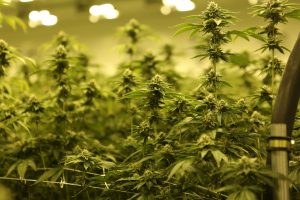
The discussion of cannabis withdrawal and addiction is one most potheads don’t want to have. Many people claim cannabis is not addictive, though that’s actually not entirely true. Most people who use cannabis will never become addicted. However, it is possible to develop a dependence on the drug. In fact, cannabis withdrawal is more common than you might think.
According to Leafly that chronic cannabis users who consume for a long period of time are likely to experience withdrawal. They report that cannabis withdrawal can be seen in at least 35% of chronic longtime consumers.

Symptoms of Cannabis Withdrawal
Some users will experience withdrawal as a result of a built-up tolerance to THC, reports the National Institute of Drug Abuse (NIDA). Common symptoms of withdrawal include irritability, trouble sleeping, mood swings and a loss of focus. Many people also experience anxiety and dysphoria in the days after they stop cannabis use.
Some cannabis users will experience these symptoms because their bodies need to adjust to functioning without THC. The good news: cannabis withdrawal is much more mild than withdrawal from other substances like opioids and alcohol. In fact, the symptoms are very similar to those of caffeine withdrawal, according to Leafly.
But, one does not have to be addicted to experience withdrawal. Those who are more dependent are more likely to experience feelings of irritability and anxiety after they stop their use of the substance. Only a small percentage of cannabis users will become addicted. The Center for Disease Control (CDC) reports that one in 10 consumers will develop an addiction. For people under 18, it’s one in six.
Who’s at Risk for Addiction?
Genes
People who have a history of addiction in their family are at a higher risk of developing addiction, according to the NIDA. Though, the person’s environment is just as influential. Those who have a genetic predisposition have a higher chance of developing an addiction if their environment creates the right circumstances. However a person with no genetic predisposition might not fall victim to addiction given the same environment.
Potency
NIDA reports that the THC potency in cannabis has been steadily rising since the 1990s, which could be a contributing factor in addiction. Researchers don’t yet know the full long-term effects this could have on the brain.
A 2016 study in the journal Biological Psychiatry reported that the potency had risen from 4% in 1995 to 12% in 2014. Thus, concerns over cannabis and its potential addictiveness are much greater today than they were 30 years ago.
Mental health
Mental health can also play a major part in a person’s chance of developing addiction. Because drugs can supplement relief for conditions like anxiety or depression, those suffering from mental illness are at a much higher risk for becoming dependent, according to Healthline. The cycle of addiction is much more likely for those who use cannabis as a form of self-medication, whether they know they’re doing it or not.
Signs of Cannabis Withdrawal and Addiction

Dependence occurs when a person has built up a tolerance to the drug. Dependence becomes addiction when the drug begins to interfere with their life. Common signs of addiction include: increased use, increased time and money spent, and irritability or anxiety when they begin to run low on their supply.
According to a study in the Journal of Neuroimmune Pharmacology, most users will not experience tolerance or withdrawal. However, for those that do, it’s important to recognize the signs and seek help if you need it.
Any cannabis user should make it a priority to keep a healthy balance between their lives and their love for THC. As they say, everything in moderation. Sadly, you can, in fact, have too much of a good thing. Unfortunately, people tend only to address addiction when it has already caused destruction in their life. Understanding the risks and signs of dependence can help ward off a developing addiction.
If you or a loved one is experiencing withdrawal or addiction, visit The Substance Abuse and Mental Health Services Administration (SAMHSA) National Helpline 1 (800) 662-4357.


Cannabis is NOT INHERENTLY nor INTRINSICALLY addictive BUT We the Patients can addict ourselves to almost all inputs/substances/activities through MANY WAYS – we can endeavor to NOT over simplify addiction – NULLIFICATION (shot of booze: one moment we are ONE PERSON then we NULLIFY that person with a chemical); REWARD (sugar; we give ourselves a euphoria short cut substance); remedy ISOLATION (it sometimes feels better to be CONNECTED to something than the feeling of being alone) and More = IF We the Patients AVOID these pathways to addiction then We the Patients will NOT be addicted EVER
 Growing the plant also helps with addiction
Growing the plant also helps with addiction 
Tolerance breaks, LOOSELY, every 2 or 4 or 6 weeks for 24 or 48 or 72 hours; we can titrate MEDICINAL HEMP for our tolerance breaks
Please put some hemp CBD and hemp CBG flowers to polyculturize the titration
Please try NOT to titrate for NULLIFICATION OR REWARD OR TO END ISOLATION because these are pathways to addiction potentially
HEMP for CAREFUL TITRATION
There are MORE THAN 60 CBD flowers; CBD is NOT a monolith
There are MORE THAN 10 CBG flowers; CBG is NOT a monolith
Please add medicinal CBDs flowers and medicinal CBGs flowers hemp to AVOID addiction to end it hopefully

Medicinal THC is NOT inherently addictive, however
Cannabis is what we do with it
FOR NO ADDICTION AND NARY A WITHDRAWAL ISSUE: “Chemical free” Cannabis, Hemp, & Weed
NOT a slave to the High (thwarts addiction)
NOT helpless to the Intoxicant (erases anxiety, paranoia, psychosis)
NOT reliant on products infrastructure (budget friendly)
NOT condemnable by chemical monoculture (botanical)
ALL EXISTENTIAL HOMEOSTATIC HIGHS
CANNABIS is medicine for ALL POOR people of ALL SKIN PIGMENTATIONS
This is TITRATION EDUCATIONAL Marketing and CAN WIN because it MAKES THE MEDICINE SAFE and ELIMINATES ADDICTION
You asked and there is your answer: please try to learn this skill: “Please put some Hemps on the Weed” and then TEACH OTHERS so we don’t have breathylizers please